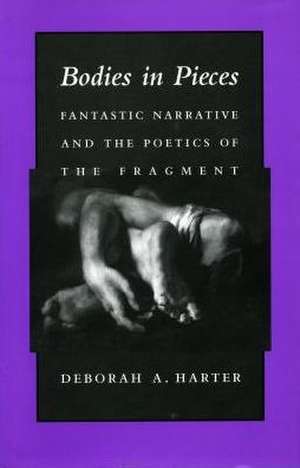Bodies in Pieces: Fantastic Narrative and the Poetics of the Fragment
Autor Deborah A. Harteren Limba Engleză Hardback – 30 noi 1995
Preț: 368.19 lei
Nou
Puncte Express: 552
Preț estimativ în valută:
70.45€ • 73.74$ • 58.64£
70.45€ • 73.74$ • 58.64£
Carte indisponibilă temporar
Doresc să fiu notificat când acest titlu va fi disponibil:
Se trimite...
Preluare comenzi: 021 569.72.76
Specificații
ISBN-13: 9780804725071
ISBN-10: 0804725071
Pagini: 167
Dimensiuni: 147 x 224 x 20 mm
Greutate: 0.38 kg
Editura: Stanford University Press
ISBN-10: 0804725071
Pagini: 167
Dimensiuni: 147 x 224 x 20 mm
Greutate: 0.38 kg
Editura: Stanford University Press
Textul de pe ultima copertă
Bodies in Pieces explores the insistent presence of the fragmented body in fantastic narrative of the nineteenth century - its characteristic beating hearts and severed hands, its breasts and feet and teeth and lost meshes of hair. In the process it uncovers a poetics of the fragment that both fundamentally defines this genre and links it to its contemporary and "other", the realist novel. Reading texts from Hoffmann to Maupassant, from Balzac and Poe to Villiers de l'Isle-Adam, the author reflects on the body's production through both textual and subjective shattering, on its violation of material and discursive categories, and on its depiction of the mutilated feminine in terms of a transparently male agony. She asks how this body's pieces function to determine fantastic discourse, from what violence they are produced, to whom they belong. And she suggests that, in contradistinction to the structured and structuring unities of the realist novel, the fragmented body in fantastic narrative represents this genre's underlying fascination with all that is fragmentary and incomplete. But this study discovers in this narrative form more than just a poetics of the fragment. It discovers as well that just as the realist novel is fraught with parts that finally give the lie to its desperate efforts at achieving unity - constructing the human body itself in ways that reveal its careful patchwork of pieces - so the fragment in fantastic narrative betrays a certain anguished gesture toward its own, different vision of wholeness. Adding to her discussion the novels of Dickens, Eliot, and Flaubert, the author proposes that the differing strategies of these two genres - the one pressing toward, theother away from totalization - are a complementary set of terms in a single imaginative system. In this system, fantastic narrative becomes for the realist novel far less an opposing than a reflective other, while realist discourse is discovered in all its fragmented, "fantastic" nature.
